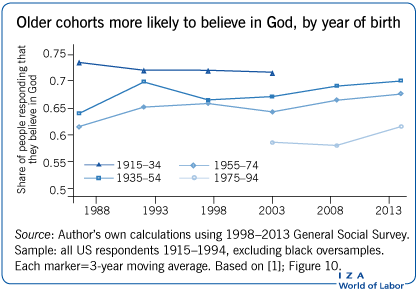Elevator pitch
The literature on the economics of religion finds that increased religious participation or religious density is associated with positive socio-economic outcomes such as increased earnings, educational attainment, and lower engagement in risky behaviors. The literature suggests that this relationship is causal, and that the gains from religion often tend to be accrued among low-skill or marginalized youth groups. In turn, as education and income increase, societies become more secular. Will the positive outcomes associated with religion disappear as western societies become more secularized?
Key findings
Pros
Cross-country data suggest a positive relationship between religious participation and economic growth, yet this relationship decelerates as religiosity increases.
Using individual data, religion is positively associated with socio-economic outcomes, and the association is strongest among high risk or marginalized populations.
A plural market for religion, i.e. the coexistence of multiple religions in a country, increases religious participation, and potentially religious beliefs indirectly.
Research based on individual data suggests that religious beliefs associated with positive socio-economic outcomes may be enhanced through religious participation.
Cons
A state religion results in a lower quality of religious services and a lower preponderance of religious beliefs among individuals, although it may result in more participation.
Religion and religiosity are multi-dimensional and difficult to quantify.
Increased secularization may result in societies forgoing any benefits associated with religious beliefs and participation.
Research shows that increased secularization results in higher engagement in riskier behavior (e.g. drug and alcohol consumption).
